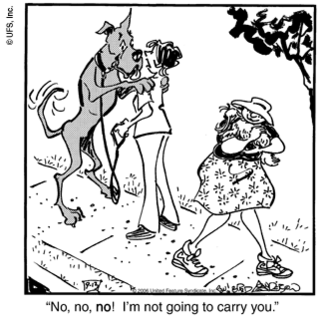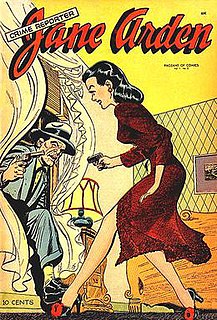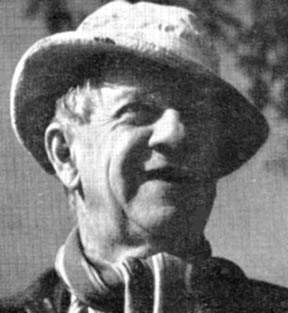Little Fibbs
On May 7, 2006, Brown and Hargis changed the name of the strip to Little Fibbs and changed the premise, focusing on the younger Fibbs as a precocious boy. The transition from the old format to the new began with the elder Franklin using a time machine to visit his younger self. After a series of strips involving both characters, readers learned that the elder Franklin was a figment of the younger boy's imagination, and Franklin's elder self disappeared. King Features marketing manager Rose McAllister stated that the change was made to avoid the perception that the strip was only designed for older readers. Paloma is still a character as a young girl, but the strip also featured Franklin's cat Roscoe and Clyde, a gila monster.

The Gila monster is a species of venomous lizard native to the southwestern United States and northwestern Mexican state of Sonora. A heavy, typically slow-moving lizard, up to 60 cm (2.0 ft) long, the Gila monster is the only venomous lizard native to the United States and one of only two known species of venomous lizards in North America, the other being its close relative, the Mexican beaded lizard. Although the Gila monster is venomous, its sluggish nature means it represents little threat to humans. However, it has acquired a fearsome reputation, and is sometimes killed despite being protected by state law in Arizona.
The new change did not increase the newspaper sales, and after few months, it ended. According to McAllister, the Fibbs strip maintained about 25–35 newspapers during its two-year run.[1]
The last strips appeared during the first week of October 2006 when the elder Franklin returned in his time machine. Big and little Fibbs then considered whom to blame for the strip's cancellation—everyone but the writer, Hollis Brown. The last daily appeared on Saturday, October 8, and the last Sunday was published on October 9.

Peanuts is a syndicated daily and Sunday American comic strip written and illustrated by Charles M. Schulz that ran from October 2, 1950, to February 13, 2000, continuing in reruns afterward. Peanuts is among the most popular and influential in the history of comic strips, with 17,897 strips published in all, making it "arguably the longest story ever told by one human being". At its peak in the mid- to late 1960s, Peanuts ran in over 2,600 newspapers, with a readership of around 355 million in 75 countries, and was translated into 21 languages. It helped to cement the four-panel gag strip as the standard in the United States, and together with its merchandise earned Schulz more than $1 billion.

The Phantom is an American adventure comic strip, first published by Lee Falk in February 1936. The main character, the Phantom, is a fictional costumed crime-fighter who operates from the fictional African country of Bangalla. The character has been adapted for television, film and video games.

Milton Arthur Paul "Milt" Caniff was an American cartoonist famous for the Terry and the Pirates and Steve Canyon comic strips.

Marmaduke is a newspaper comic strip revolving around the Winslow family and their Great Dane, Marmaduke, drawn by Brad Anderson from 1954 to 2015.
A daily strip is a newspaper comic strip format, appearing on weekdays, Monday through Saturday, as contrasted with a Sunday strip, which typically only appears on Sundays.

Jane Arden was an internationally syndicated daily newspaper comic strip which ran from 1927 to 1968. The title character was the original "spunky girl reporter," actively seeking to infiltrate and expose criminal activity rather than just report on its consequences and served as a prototype for later characters such as Superman supporting character Lois Lane and fellow comic strip heroine Brenda Starr, Reporter. Pulitzer Prize-winning columnist Mary McGrory credited Jane Arden with instilling her interest in journalism.
Ask Shagg is a syndicated daily comic strip drawn by cartoonist Peter Guren since 1980. It is distributed by Creators Syndicate; it had been distributed by United Feature Syndicate from 1980 until 1995. The strip has run in dozens of newspapers including The Boston Globe, The Columbus Dispatch, and the Seattle Post-Intelligencer. In each strip Guren, through his Shagg E. Dawg character, answers questions from readers about the animal kingdom.
Triple Take was an American comic strip by Todd Clark and Scott Nickel that featured three separate punch lines in each daily installment. The strip was syndicated by King Features Syndicate and ran from April 4, 2005 to August 26, 2007. Clark provided the majority of the writing with Nickel drawing the strip and contributing gags.

The Sunday comics or Sunday strip is the comic strip section carried in most western newspapers, almost always in color. Many newspaper readers called this section the Sunday funnies, the funny papers or simply the funnies.

Radio Patrol was a police comic strip carried in newspapers from 1933 to 1950 in the dailies, with a Sunday strip that ran from 1934 to 1946. It was created by artist Charles Schmidt and writer Eddie Sullivan, who both worked for the Boston American. Sullivan was a newspaper reporter who specialized in crime reporting.

Allen Saunders was an American writer, journalist and cartoonist who wrote the comic strips Steve Roper and Mike Nomad, Mary Worth and Kerry Drake.

The Brilliant Mind of Edison Lee is a comic strip created by John Hambrock and distributed by King Features Syndicate. It debuted November 12, 2006. While this strip is about a ten-year-old boy genius, Edison Lee, it also has aspects of an editorial cartoon since Edison constantly talks about the US political, and economic situation. In March 2010, the strip was nominated for the National Cartoonists Society's division award in the category Newspaper Comic Strip, along with Zits and Non Sequitur.

Deflocked is a comic strip written and illustrated by Jeff Corriveau, which follows the adventures of four major characters, described as "deliriously funny yet seriously dysfunctional." The strip, which Corriveau originally based loosely on Hippocrates' Four Humours attempts to detail relationships similar to Norman Lear’s All in the Family through the exploits of Mamet, a wayward sheep, the dog siblings Cobb and Rupert, and Tucker, an 8-year-old boy raised by the dogs. The strip was syndicated in May 2008.
The Dinette Set is a single-panel newspaper comic by artist Julie Larson. Set in the fictional Midwestern suburban community of Crustwood, the comic satirized middle-class culture; its main characters are 50-ish sisters Verla Darwin and Joy Penny. The comic poked fun at middle-class perceptions of common, everyday issues.

Clare Victor Dwiggins was an American cartoonist who signed his work Dwig. Dwiggins created a number of comic strips and single-panel cartoons for various American newspapers and newspaper syndicates from 1897 until 1945, including his best-known strip, the long-running School Days.

Charles H. Winner, better known as Doc Winner, was an American cartoonist, notable for his comic strips Tubby and Elmer, plus his contributions to Thimble Theatre, Barney Google and other King Features strips.

DailyINK was an online service created by King Features Syndicate to email many classic and current comic strips directly to subscribers for an annual fee of $19.99. King Features described it as "the all-inclusive subscription service for the true comics fan." On a web site and via email, the DailyINK service made available more than 90 vintage and current comic strips, panels, games, puzzles and editorial cartoons.
Quincy is an American syndicated newspaper comic strip published from 1970 to 1986, created and produced by cartoonist Ted Shearer. The series, about an African-American boy being raised by his grandmother in Harlem, was one of the earliest mainstream comic strips to star an African American in the lead role, following Dateline: Danger! (1968-1974) and Luther (1969-1986). Another predecessor, Wee Pals, features an African-American among an ensemble cast of different races and ethnicities.














